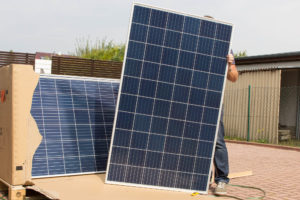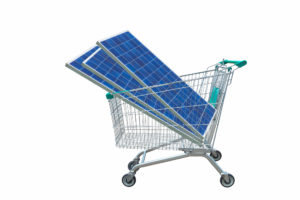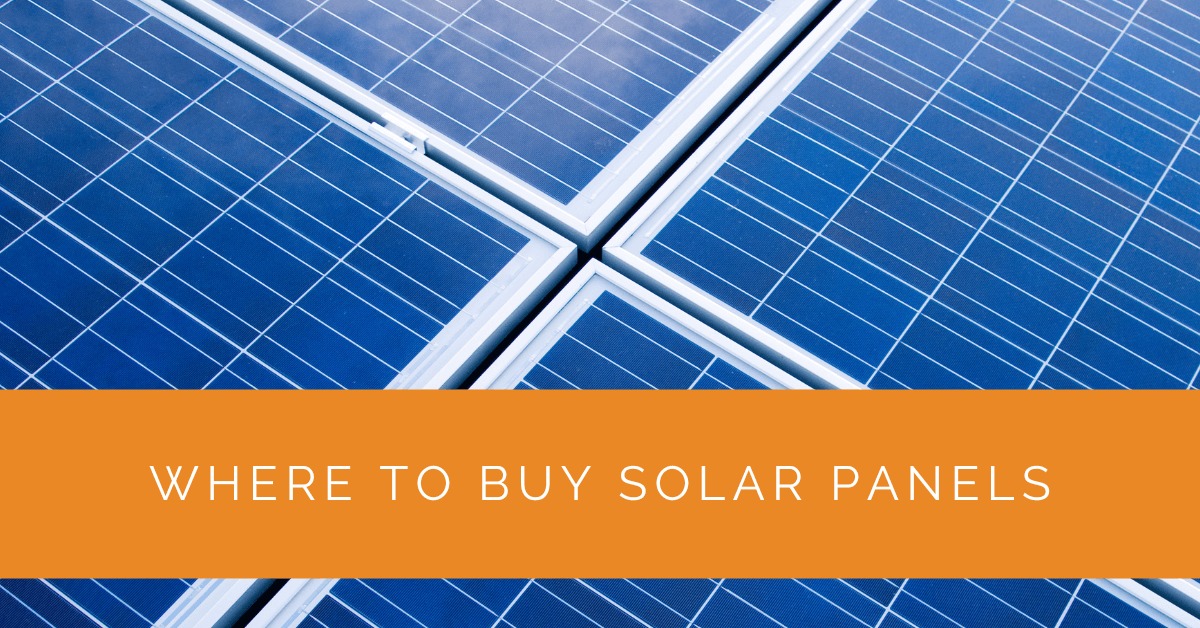The adoption of solar energy has seen a significant rise as more homeowners and businesses recognize the benefits of renewable power. As part of this transition, purchasing high-quality solar panels is crucial for a reliable and efficient solar system. In this guide, we will explore the various options available to buy solar panels and the factors to consider when purchasing.
Contents
- 1 Key Takeaways
- 2 Types of Solar Panels
- 3 Where to Buy Solar Panels
- 4 Factors to Consider when Buying Solar Panels
- 5 Case Study: Guiding Homeowners on Where to Buy Solar Panels
- 6 Expert Insights From Our Solar Panel Installers About Where to Buy Solar Panels
- 7 Experience Solar Excellence with Us!
- 8 Conclusion
- 9 FAQ
Key Takeaways
- Different types of solar panels are available, including monocrystalline, polycrystalline, thin-film, and bifacial, each with its features and benefits.
- When buying solar panels, consider reputable sources such as manufacturers, solar companies and installers, online marketplaces, local suppliers, or DIY kits, depending on your preferences and requirements.
- Factors to consider when purchasing solar panels include the quality and reliability of the panels, price and value, panel efficiency and wattage, customer reviews, and the manufacturer’s or supplier’s reputation.
Types of Solar Panels
When it comes to solar panels, there are various types available to suit different needs and preferences. Understanding the characteristics and features of each type can help you make an informed decision when choosing the right panels for your solar system.
Monocrystalline Solar Panels
Monocrystalline solar panels are highly efficient and known for their sleek and uniform appearance. They are made from a single silicon crystal structure, which gives them a distinct dark color. The uniformity of the crystal structure allows for greater electron movement, resulting in higher efficiency and power output. Monocrystalline panels are an excellent choice when you have limited space and want to maximize the energy production from your solar system.
Polycrystalline Solar Panels
Polycrystalline solar panels, also known as multicrystalline panels, are made from multiple silicon crystals. Due to the different crystal orientations, these panels have a unique blue speckled appearance. While they have slightly lower efficiency than monocrystalline panels, advancements in manufacturing technology have narrowed the efficiency gap. Polycrystalline panels are a cost-effective option for larger installations with ample roof space.
Thin-Film Solar Panels
Thin-film solar panels offer flexibility and versatility in terms of installation options. They are made by depositing thin layers of photovoltaic material onto various substrates such as glass, plastic, or metal. Thin-film panels are lightweight and can be integrated into curved surfaces or irregular shapes, making them suitable for specific applications. Although they generally have lower efficiency than crystalline panels, they perform well in low-light conditions and have a better temperature coefficient, meaning their performance is less affected by high temperatures.
Bifacial Solar Panels
Bifacial solar panels have the unique capability of generating electricity from both sides of the panel. They have a transparent backsheet that allows light to pass through and reflect onto the panel’s rear side. This enables them to capture additional energy from sunlight reflected off surrounding surfaces. Bifacial panels can increase energy production by up to 25%, depending on the installation conditions. They are commonly made with monocrystalline or polycrystalline cells and are suitable for ground-mounted or elevated solar systems.

Where to Buy Solar Panels
Finding a reliable and reputable source to buy solar panels is crucial to ensure your solar system’s quality, performance, and warranty support. Here are several options to consider when purchasing solar panels:
Solar Panel Manufacturers
Purchasing directly from solar panel manufacturers offers several advantages. It guarantees the authenticity of the panels and provides access to the latest products and technologies. Reputable manufacturers like Canadian Solar, JA Solar, and others have a wide range of panel options available and established distribution networks. Buying directly from manufacturers can give you peace of mind and confidence in the quality of the panels you purchase.
Solar Companies and Installers
Solar companies and installers provide installation services and offer solar panels for purchase. These companies have in-depth knowledge of different panel types and can recommend the most suitable options based on your requirements. Working with a solar installer ensures seamless integration of the panels into your solar system and provides professional guidance throughout the process. They can also help you navigate the complex landscape of solar incentives and financing options.
Online Solar Marketplaces
Online solar marketplaces have emerged as convenient platforms for purchasing solar panels. These marketplaces offer a wide selection of panels from various manufacturers and suppliers. They allow users to compare prices, read customer reviews, and access a diverse range of products. When buying from online marketplaces, it’s important to ensure the credibility of the sellers and verify that they offer genuine products. Reading customer reviews and checking the seller’s reputation can help you make an informed decision.
Local Solar Suppliers
Supporting local businesses can be advantageous when purchasing solar panels. Local solar suppliers often have partnerships with manufacturers and can offer competitive pricing. They understand local regulations well and can provide tailored recommendations based on regional requirements and weather conditions. Buying from local suppliers also promotes economic growth and strengthens the local solar industry.
DIY Solar Panel Kits
For those with technical expertise and a desire for hands-on involvement, DIY solar panel kits provide an opportunity to purchase panels directly and install them independently. DIY kits are available through online platforms and specialized retailers. They include all the necessary components and instructions for installation. However, it’s important to note that installing solar panels yourself requires a thorough understanding of electrical systems, permits, and safety protocols. Proper research and knowledge are essential to ensure a successful and safe installation.

Factors to Consider when Buying Solar Panels
Purchasing solar panels is a significant investment, and considering the following factors can help you make an informed decision:
Quality and Reliability
Investing in high-quality solar panels is crucial for long-term performance and reliability. Look for panels tested and certified by recognized industry standards, such as the International Electrotechnical Commission (IEC) and the Underwriters Laboratories (UL). Reliable manufacturers provide warranties that cover the performance and durability of the panels, giving you peace of mind regarding their quality.
Price and Value
While price is important, it should not be the sole determining factor. Evaluate the long-term value of the panels by considering factors such as their efficiency, power output, and warranty coverage. Higher-priced panels often offer higher efficiency, better temperature coefficients, and longer warranties, which can result in better returns on your investment over the solar system’s lifetime.
Panel Efficiency and Wattage
Efficiency and wattage play a significant role in determining the energy output of solar panels. Higher-efficiency panels can convert a greater amount of sunlight into electricity, maximizing the energy production of your solar system. However, higher-efficiency panels often come at a higher cost. Consider your available roof space and energy needs when deciding the ideal balance between efficiency and wattage.
Customer Reviews and Reputation
Considering customer reviews and the manufacturer’s or supplier’s reputation is essential when buying solar panels. Read reviews from other customers to gauge their experiences and satisfaction levels. Additionally, research the manufacturer’s or supplier’s reputation and track record to ensure their reliability, customer support, and after-sales service.
By carefully considering these factors and exploring the options available, you can make an informed decision and choose the right solar panels for your specific needs, ensuring a reliable and efficient solar energy system for your home or business.
Case Study: Guiding Homeowners on Where to Buy Solar Panels
Background
At Solar Panels Network USA, our mission is to empower homeowners with the knowledge and resources they need to transition to solar energy. Recently, we assisted a homeowner in selecting and purchasing the right solar panels for their home. The goal was to ensure they received high-quality panels from a reliable source, tailored to their specific needs.
Project Overview
The homeowner was eager to switch to solar energy but was overwhelmed by the myriad of options available for purchasing solar panels. They sought our guidance to navigate the various sources and factors involved in making an informed decision.
Implementation
After an initial consultation, we outlined the different types of solar panels and potential sources for purchasing them. We then guided the homeowner through the decision-making process.
Types of Solar Panels: We explained the differences between monocrystalline, polycrystalline, thin-film, and bifacial solar panels. Monocrystalline panels were recommended for their high efficiency and sleek appearance, which suited the homeowner’s preference for maximizing energy production with limited roof space.
Sources for Purchasing Solar Panels:
1. Solar Panel Manufacturers: We introduced the homeowner to reputable manufacturers like Canadian Solar and JA Solar. Purchasing directly from these manufacturers guaranteed authenticity and access to the latest technology.
2. Solar Companies and Installers: We recommended local solar companies that offered both panels and installation services. This option provided professional installation and seamless integration of the panels into their solar system.
3. Online Solar Marketplaces: We discussed the convenience of online solar marketplaces, which offer a wide selection of panels from various manufacturers. We advised the homeowner to read customer reviews and verify the credibility of sellers to ensure they received genuine products.
4. Local Solar Suppliers: Supporting local suppliers was another viable option. We connected the homeowner with local businesses that offered competitive pricing and tailored recommendations based on regional requirements.
5. DIY Solar Panel Kits: For those interested in a hands-on approach, we explained the availability of DIY solar panel kits. These kits include all necessary components and instructions for installation, suitable for homeowners with technical expertise.
Results
The homeowner decided to purchase monocrystalline panels directly from a reputable manufacturer, Canadian Solar. They also opted for professional installation through a local solar company to ensure seamless integration and optimal system performance.
Quality Assurance: By purchasing from a reputable manufacturer, the homeowner received high-quality panels with a robust warranty, ensuring long-term reliability and performance.
Professional Installation: The local solar company provided expert installation, ensuring the panels were correctly installed and integrated into the homeowner’s existing energy system.
Customer Satisfaction: The homeowner was highly satisfied with their decision, enjoying reduced energy bills and the peace of mind that comes with a reliable, high-performance solar system.
Summary
Our experience with guiding the homeowner through the process of purchasing solar panels highlights the importance of understanding different panel types and reliable sources. By considering factors like quality, price, efficiency, and customer reviews, homeowners can make informed decisions that lead to successful and satisfying solar energy investments. At Solar Panels Network USA, we remain committed to providing expert guidance and top-quality solar solutions to help homeowners transition to clean, sustainable energy.
Expert Insights From Our Solar Panel Installers About Where to Buy Solar Panels
Purchasing directly from reputable manufacturers ensures you get the latest technology and authentic products, which is crucial for long-term performance and warranty support.
Senior Solar Installer
Working with local solar suppliers not only supports your community but also provides tailored recommendations based on regional requirements and weather conditions, ensuring optimal system performance.
Lead Solar Technician
DIY solar panel kits can be a great option for those with technical expertise and a desire for hands-on involvement. Just ensure you have a thorough understanding of electrical systems and safety protocols.
Solar Installation Manager
Experience Solar Excellence with Us!
Trust in Solar Panels Network USA, where our seasoned experts deliver top-quality solar solutions for homes and businesses nationwide. With a legacy of countless successful installations and a commitment to sustainable energy, we’re your reliable partner in the solar journey. Ready for a brighter, eco-friendly future? Call us now at (855) 427-0058 and harness the power of the sun!
Conclusion
When purchasing solar panels, choosing a reliable source that offers high-quality products and excellent customer support is crucial. Consider the type of solar panel that suits your needs, whether monocrystalline, polycrystalline, thin-film, or bifacial. Explore options such as purchasing directly from manufacturers, working with solar companies and installers, utilizing online marketplaces, or supporting local suppliers. By evaluating factors like quality, price, efficiency, and customer reviews, you can decide to power your home or business with clean and sustainable solar energy.
FAQ
Can I purchase my solar system?
Yes, you can purchase your solar system. Various options are available, such as buying solar panels directly from manufacturers, working with solar companies and installers, utilizing online marketplaces, or even opting for DIY solar panel kits.
What are the best solar panels money can buy?
The best solar panels vary based on individual needs and preferences. Factors to consider include panel efficiency, power output, durability, warranty, and the manufacturer’s reputation. Reputable brands like Canadian Solar, JA Solar, and others offer high-quality panels with excellent performance.
Can you buy one solar panel at a time?
Yes, it is possible to buy a single solar panel. However, it’s important to note that most solar systems are designed with multiple panels to generate sufficient power. Purchasing individual panels may not be cost-effective, and consulting with solar companies or installers is advisable to determine the optimal system size for your energy needs.

